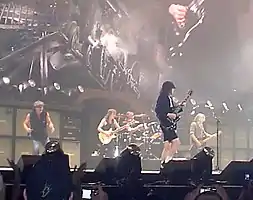

AC/DC are an Australian rock band from Sydney. Formed in November 1973, the group originally consisted of vocalist Dave Evans, lead guitarist Angus Young, rhythm guitarist Malcolm Young (his older brother), bassist Larry Van Kriedt and drummer Colin Burgess. The band's current lineup features Angus Young, drummer Phil Rudd (from 1975 to 1983, 1994 to 2015, and since 2018), bassist Cliff Williams (from 1977 to 2016, and since 2018), vocalist Brian Johnson (from 1980 to 2016, and since 2018), and rhythm guitarist Stevie Young (nephew of Angus and Malcolm Young, a member since 2014).
History
AC/DC formed in November 1973 by brothers Malcolm and Angus Young,[1][2] with drummer Colin Burgess (ex-the Masters Apprentices), bassist and saxophonist Larry Van Kriedt and vocalist Dave Evans.[2][3][4] The group recorded single "Can I Sit Next to You, Girl" in January–February 1974 at EMI Studios in Sydney, with older brother George Young and Harry Vanda as the producers – both were former members of the Easybeats and Marcus Hook Roll Band.[3][4] A week after this session Burgess was fired, followed shortly thereafter by Van Kriedt, his recorded bass lines for the January session being re-recorded by George. Their replacements, Neil Smith on bass and Noel Taylor on drums, lasted six weeks, replaced in turn by Rob Bailey and Peter Clack, respectively.[1][3][4]
In September 1974, vocalist Bon Scott (ex-Valentines and Fraternity) joined AC/DC, after former bandmate Vince Lovegrove recommended him to George. Scott had worked as a chauffeur for the group in Adelaide until an audition promoted him to lead singer.[5] Scott also had experience as a songwriter and drummer.[6] Both Bailey and Clack were fired in January 1975,[2] with Paul Matters taking over bass duties briefly before being fired in turn and replaced temporarily by George or Malcolm for live duties.[3][4] Meanwhile, on drums, Ron Carpenter and Russell Coleman had brief tenures before Phil Rudd (ex-Buster Brown) joined in that month.[3][4] Bassist Mark Evans was enlisted in March 1975, setting the line-up, which lasted two years.[3][4][7]: 98, 100, 102–103, 109–111 In mid-1977, Mark Evans was fired – he ascribed disagreements with Angus and Malcolm as a contributing factor.[2] He was replaced on bass guitar by Cliff Williams, (ex-Home and Bandit).[3][4][5]
In February 1980, after the release of Highway to Hell (1979), Scott died to acute alcohol poisoning.[8]: 106 [9] The band briefly considered quitting, but encouraged by the insistence from Scott's parents that he would have wanted them to carry on, they decided to continue and sought a new vocalist,[5] to which vocalist Brian Johnson (ex-Geordie) was officially announced as the lead singer of AC/DC on 1 April 1980.[10] In April 1983, following an altercation with Malcolm Young and ongoing problems with substance abuse, Rudd was fired from AC/DC.[11] In April 1988, following the Blow Up Your Video World Tour shows across Europe, Malcolm announced that he was taking time off touring, principally to deal with his alcoholism. Angus and Malcolm's nephew, Stevie Young, temporarily replaced Malcolm on guitar.[3][12] In 1989, Wright left the group to work on British heavy metal band Dio's fifth studio album Lock Up the Wolves (1990); he was replaced by session veteran Chris Slade.[3][4] Angus and Malcolm invited Rudd to several jam sessions during 1994; he was rehired to replace Slade.[11]
On 23 September 2014, AC/DC members confirmed that Malcolm had officially retired from performing, due to his early onset dementia.[13] He died on 18 November 2017 aged 64, due to the dimentia.[14] On 6 November 2014, Rudd was charged with threatening to kill, possession of methamphetamine and possession of cannabis, following a police raid on his home.[15][16][17] AC/DC's remaining members issued a statement clarifying that the tour promoting Rock or Bust would continue, but did not indicated whether or not Rudd would participate, or whether he was still a member.[18] At a charity signing before the Grammy Awards, the band were photographed together with Slade. It was later confirmed that he had rejoined for the Grammys and upcoming tour.[19] Shortly thereafter, the band's web site removed Rudd as their drummer and replaced him with Slade.[20]
On 7 March 2016, the band announced that the final ten dates of the second North American leg of the Rock or Bust World Tour would be rescheduled as Johnson's doctors had ordered him to stop touring immediately: he risked complete deafness if he persisted. The ten cancelled dates were to be rescheduled, "likely with a guest vocalist" later in the year, leaving Johnson's future in touring with the group uncertain.[21] On 16 April 2016, Guns N' Roses front man Axl Rose was announced as the lead vocalist for the remainder of their 2016 tour dates.[22] Williams indicated he was leaving AC/DC during an interview with Gulfshore Life's Jonathan Foerste on 8 July 2016, "It's been what I've known for the past 40 years, but after this tour I'm backing off of touring and recording. Losing Malcolm, the thing with [Rudd] and now with [Johnson], it's a changed animal. I feel in my gut it's the right thing."[23] At the end of the Rock or Bust World Tour, he released a video statement confirming his departure.[24]
After completing the tour in 2016, AC/DC went on hiatus. Over the next few years, speculation grew that former members Johnson and Rudd were back and working with the band again. A fan living near the Warehouse Studio, Vancouver claimed to have observed them in the outdoor area of the studio from an apartment window.[25][26] The rumors have been confirmed to be true two years later, as on 30 September 2020, they announced the return of Johnson, Williams and Rudd to the line-up alongside Angus and Stevie, reuniting the Rock or Bust line-up.[27] On 9 September 2023, one month before their scheduled show on the Power Trip festival, AC/DC revealed that Williams was part of the line-up after coming out of retirement,[28] and American drummer Matt Laug, who had previously played for Slash's Snakepit and Alice Cooper, replaced Rudd.[29]
Members
Current
| Image | Name | Years active | Instruments | Release contributions |
|---|---|---|---|---|
| Angus Young | 1973–present |
|
all AC/DC releases | |
| Phil Rudd |
|
|
all AC/DC releases from T.N.T. (1975) to Flick of the Switch (1983), and since Ballbreaker (1995) | |
| Cliff Williams |
|
|
all AC/DC releases since Powerage (1978) | |
| Brian Johnson |
|
lead vocals | all AC/DC releases since Back in Black (1980) | |
| Stevie Young |
|
|
All AC/DC releases since Rock or Bust (2014) |
Former
| Image | Name | Years active | Instruments | Release contributions |
|---|---|---|---|---|
| Malcolm Young | 1973–2014 (died 2017) |
|
all AC/DC releases from "Can I Sit Next to You, Girl" (1974) to Live at River Plate (2012) | |
| Dave Evans | 1973–1974 | lead vocals | "Can I Sit Next to You, Girl" (1974) | |
| Larry Van Kriedt |
|
bass guitar | none – live performances only[5]: 59 | |
| Colin Burgess |
|
drums | "Can I Sit Next to You, Girl" (1974). Returned to fill in for Rudd temporarily in 1975, for live performances only | |
| Neil Smith | 1974 (died 2013) | bass guitar | none – live performances only[5]: 62–65 | |
| Ron Carpenter | 1974 | drums | ||
| Russell Coleman | ||||
| Noel Taylor | ||||
| Rob Bailey | 1974–1975 | bass guitar | High Voltage (1975) | |
| Peter Clack | drums | High Voltage (1975) – "Baby, Please Don't Go" only | ||
| Bon Scott | 1974–1980 (until his death) |
|
all AC/DC releases from High Voltage (1975) to Highway to Hell (1979) | |
| Paul Matters | 1975 (died 2020) | bass guitar | none – live performances only[5]: 132, 141 | |
| Mark Evans | 1975–1977 | all AC/DC releases from T.N.T. (1975) to Let There Be Rock (1977) | ||
| Simon Wright | 1983–1989 |
|
all AC/DC releases from Fly on the Wall (1985) to Blow Up Your Video (1988) | |
| Chris Slade |
|
all AC/DC releases from The Razors Edge (1990) to "Big Gun" (1993) |
Others
| Image | Name | Years active | Instruments | Notes |
|---|---|---|---|---|
| George Young | 1974–1975 (died 2017) |
|
Young filled in on bass on several occasions during the band's early shows, amid frequent lineup changes. He also played bass on a number of tracks on High Voltage (1975).[5] | |
| Tony Currenti | 1974–1975 | drums | Played drums on seven songs for High Voltage (1975) plus the "High Voltage" single as a session musician before Rudd joined.[30] | |
| Denis Loughlin | 1974 (died 2019) | lead vocals | Loughlin, the band's manager at the time, would occasionally substitute for Dave Evans during early shows.[31] | |
| Bruce Howe | 1975 | bass guitar | Howe, Bon Scott's former bandmate in Fraternity, performed bass a number of times with the group.[5] | |
| Paul Gregg | 1991 | Gregg replaced Cliff Williams for several shows on the US leg of the Razors Edge World Tour due to illness.[32]: 178 | ||
| Bob Richards | 2014 | drums | Substituted for Phil Rudd on the "Play Ball" and "Rock or Bust" music video.[33] | |
| Axl Rose | 2016 | lead vocals | Replaced Brian Johnson for the last two legs of the Rock or Bust World Tour, due to Johnson's hearing problems.[22] | |
| Matt Laug | 2023–present | drums | Fill in for Phil Rudd For the Power Trip Festival.[29] | |
Timeline
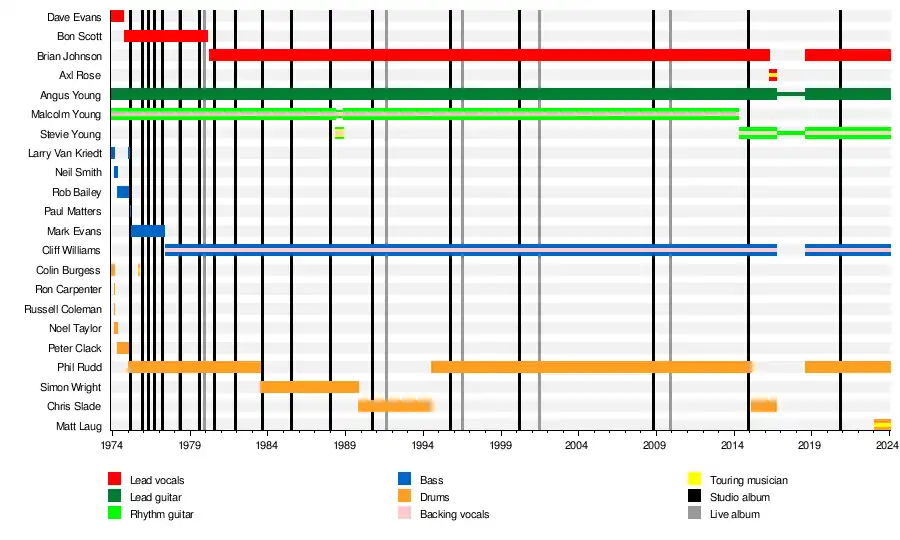
Lineups
| Period | Members | Releases |
|---|---|---|
| November 1973 – February 1974 |
|
none |
| February 1974 |
| |
|
| |
|
none | |
| ||
| February – April 1974 |
| |
| April – September 1974 |
| |
| September 1974 – November 1974 |
|
|
| November 1974 |
| |
| ||
| November 1974 – January 1975 |
|
none |
| January – February 1975 |
| |
| February 1975 |
| |
| February – March 1975 |
| |
| March 1975 |
| |
| March 1975 – May 1977 |
|
|
| May 1977 – February 1980 |
|
|
| February – March 1980 |
|
none |
| April 1980 – April 1983 |
|
|
| July 1983 – May 1988 |
|
|
| May – November 1988 |
|
none |
| November 1988 – November 1989 |
| |
| November 1989 – August 1994 |
|
|
| August 1994 – April 2014 |
|
|
| April 2014 – February 2015 |
|
|
| February 2015 – April 2016 |
|
none |
| April 2016 – September 2016 |
| |
| Band on hiatus September 2016 – August 2018 | ||
| August 2018 – 2023 |
|
|
| 2023 – present |
|
none |
References
- 1 2 "AC/DC Lineup Changes: A Complete Guide". Ultimate Classic Rock. 18 April 2016. Archived from the original on 4 September 2023. Retrieved 15 November 2023.
- 1 2 3 4 Kimball, Duncan (2004). "AC/DC". Milesago: Australasian Music and Popular Culture 1964–1975. Ice Productions. Archived from the original on 16 March 2010. Retrieved 15 November 2023.
- 1 2 3 4 5 6 7 8 9
- 1st edition [on-line]: McFarlane, Ian (1999). "Encyclopedia Entry for 'AC/DC'". Encyclopedia of Australian Rock and Pop. St Leonards, NSW: Allen & Unwin. ISBN 1-86508-072-1. Archived from the original on 19 April 2004. Retrieved 15 November 2023.
- 2nd edition [print]: McFarlane, Ian; Jenkins, Jeff (Foreword) (2017). "Encyclopedia entry for 'AC/DC'". The Encyclopedia of Australian Rock and Pop (2nd ed.). Gisborne, VIC: Third Stone Press. pp. 8–9. ISBN 978-0-9953856-0-3.
- 1 2 3 4 5 6 7 8 Holmgren, Magnus. "AC/DC". Australian Rock Database. Archived from the original on 6 December 2003. Retrieved 15 November 2023.
- 1 2 3 4 5 6 7 8 Wall, Mick (2012). AC/DC: Hell Aint a Bad Place to Be. London: Orion Publishing Group. ISBN 978-1-4091-1535-9.
- ↑ Nimmervoll, Ed. "AC/DC". Howlspace – The Living History of Our Music. Archived from the original on 27 July 2012. Retrieved 15 November 2023.
- ↑ Engleheart, Murray; Durieux, Arnaud (2008). AC/DC: Maximum Rock & Roll. HarperCollins. ISBN 978-0061133923.
- ↑ Elliott, Paul (2018). AC/DC: For Those About to Rock. Harper Grant Books. ISBN 978-174379488-3.
- ↑ Jinman, Richard (19 February 2005). "25 Years on, AC/DC Fans Recall How Wild Rocker Met His End". The Guardian. Archived from the original on 19 November 2013. Retrieved 15 November 2023.
- ↑ Rivadavia, Eduardo (1 April 2015). "How Happenstance Originally Brought Brian Johnson to AC/DC". Ultimate Classic Rock. Archived from the original on 3 September 2023. Retrieved 15 November 2023.
- 1 2 Lifton, Dave (19 July 2015). "Bad Boy Boogie: A Phil Rudd Timeline". Ultimate Classic Rock. Archived from the original on 31 July 2015. Retrieved 15 November 2023.
- ↑ Olivier (26 December 2021). "Simon Wright recalls Stevie Young Replacing Malcolm Young on AC/DC's Blow Up Your Video World Tour". Sleaze Roxx. Archived from the original on 3 September 2023. Retrieved 15 November 2023.
- ↑ Vincent, Peter (24 September 2014). "AC/DC Confirm Malcolm Young's Retirement, Rock or Bust Album and World Tour". The Sydney Morning Herald. Archived from the original on 25 September 2014. Retrieved 15 November 2023.
- ↑ Kreps, Daniel (18 November 2017). "Malcolm Young, AC/DC Guitarist and Co-Founder, Dead at 64". Rolling Stone. Archived from the original on 18 November 2017. Retrieved 15 November 2023.
- ↑ Wall, Tony (6 November 2014). "AC/DC Drummer Phil Rudd on Procuring Murder Charge". Fairfax Media. Archived from the original on 6 November 2014. Retrieved 15 November 2023.
- ↑ "AC/DC Drummer Phil Rudd on New Zealand Murder Plot Charge". BBC News. 6 November 2014. Archived from the original on 12 January 2015. Retrieved 15 November 2023.
- ↑ Kenny, Katie (7 November 2014). "AC/DC Drummer Phil Rudd: Procuring Murder Charge Dropped". Fairfax Media. Archived from the original on 12 November 2014. Retrieved 15 November 2023.
- ↑ "What Now for AC/DC, After Phil Rudd's Arrest and Malcolm Young's Retirement?". The Guardian. 6 November 2014. Archived from the original on 6 November 2014. Retrieved 15 November 2023.
- ↑ "AC/DC Confirm Chris Slade Will Replace Phil Rudd on Their 2015 Tour | Music". The Guardian. Archived from the original on 7 March 2016. Retrieved 15 November 2023.
- ↑ Schaffner, Lauryn (7 October 2020). "AC/DC: A Photo Timeline of Their Legendary Career". Loudwire. Archived from the original on 10 October 2020. Retrieved 15 November 2023.
- ↑ Roffman, Michael (7 March 2016). "AC/DC Frontman Brian Johnson Ordered 'to Stop Touring Immediately or Risk Total Hearing Loss'". Consequence of Sound. Archived from the original on 15 March 2016. Retrieved 15 November 2023.
- 1 2 Kreps, Daniel (16 April 2016). "AC/DC Confirm Axl Rose Is New Lead Singer, Joining Band on Tour". Rolling Stone. Archived from the original on 17 April 2016. Retrieved 15 November 2023.
- ↑ Foerste, Jonathan (July 2016). "Still Rockin' in Southwest Florida". Gulfshore Life. Archived from the original on 12 June 2017. Retrieved 15 November 2023.
- ↑ Blistein, Jon (20 September 2016). "AC/DC Bassist Cliff Williams Confirms Retirement in Heartfelt Video". Rolling Stone. Archived from the original on 29 August 2017. Retrieved 15 November 2023.
- ↑ "Brian Johnson tilbake som vokalist i AC/DC" [Brian Johnson Back as Vocalist in AC/DC] (in Norwegian). 8 August 2018. Archived from the original on 8 August 2018. Retrieved 15 November 2023.
- ↑ "Brian Johnson and Phil Rudd Appear to Be Back in Studio with AC/DC: Photographic Proof". Blabbermouth.net. 8 August 2018. Archived from the original on 8 August 2018. Retrieved 15 November 2023.
- ↑ Moore, Sam (30 September 2020). "AC/DC Confirm Comeback and Return of Brian Johnson, Phil Rudd and Cliff Williams". NME. Archived from the original on 8 October 2020. Retrieved 15 November 2023.
- ↑ Kreps, Daniel (9 September 2023). "AC/DC Reveal Retired Bassist Cliff Williams Will Return for Power Trip Fest". Rolling Stone. Archived from the original on 10 September 2023. Retrieved 15 November 2023.
- 1 2 Lewry, Fraser (9 September 2023). "AC/DC Share Rehearsal Clip Ahead of Power Trip – and It's not Phil Rudd in the Drum Seat". Classic Rock. Archived from the original on 10 September 2023. Retrieved 15 November 2023.
- ↑ Fink, Jesse (1 November 2013). The Youngs: The Brothers Who Built AC/DC. Ebury Australia. ISBN 9781742759791.
- ↑ Ross, Annabel (30 December 2013). "AC/DC's original lead singer, Dave Evans". The Sydney Morning Herald. Fairfax Media. Retrieved 17 November 2017.
- ↑ Masino, Susan (2020). Let There Be Rock: The Story of AC/DC (Updated ed.). London, England: Omnibus Press. ISBN 978-1-913172-14-5.
- ↑ Khomami, Nadia (12 November 2014). "AC/DC unveil video for 'Play Ball' single featuring new guitarist Stevie Young – watch". NME. Retrieved 15 November 2023.

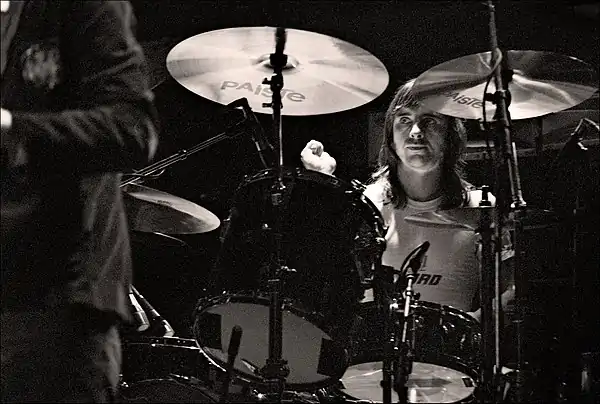
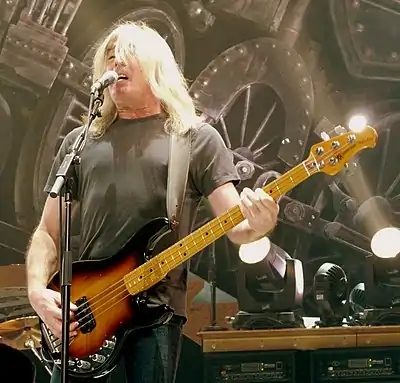
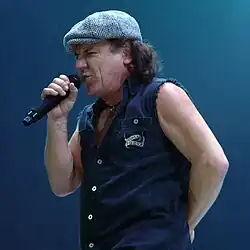

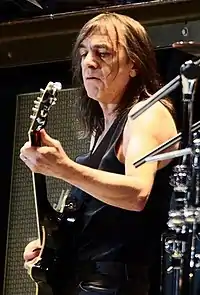

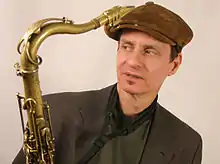
.jpg.webp)
.png.webp)
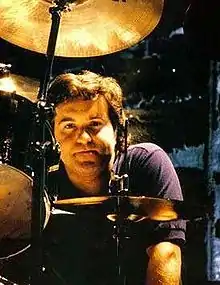
.JPG.webp)
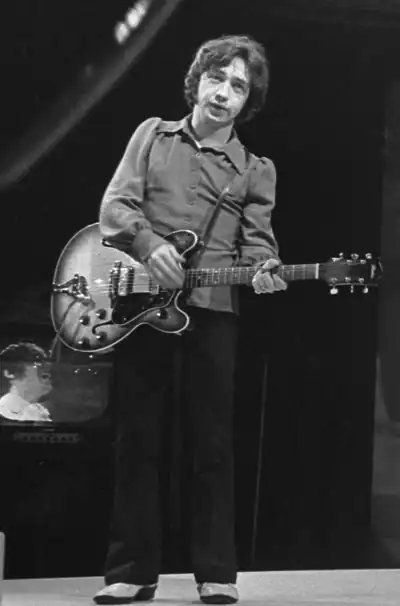

.jpg.webp)